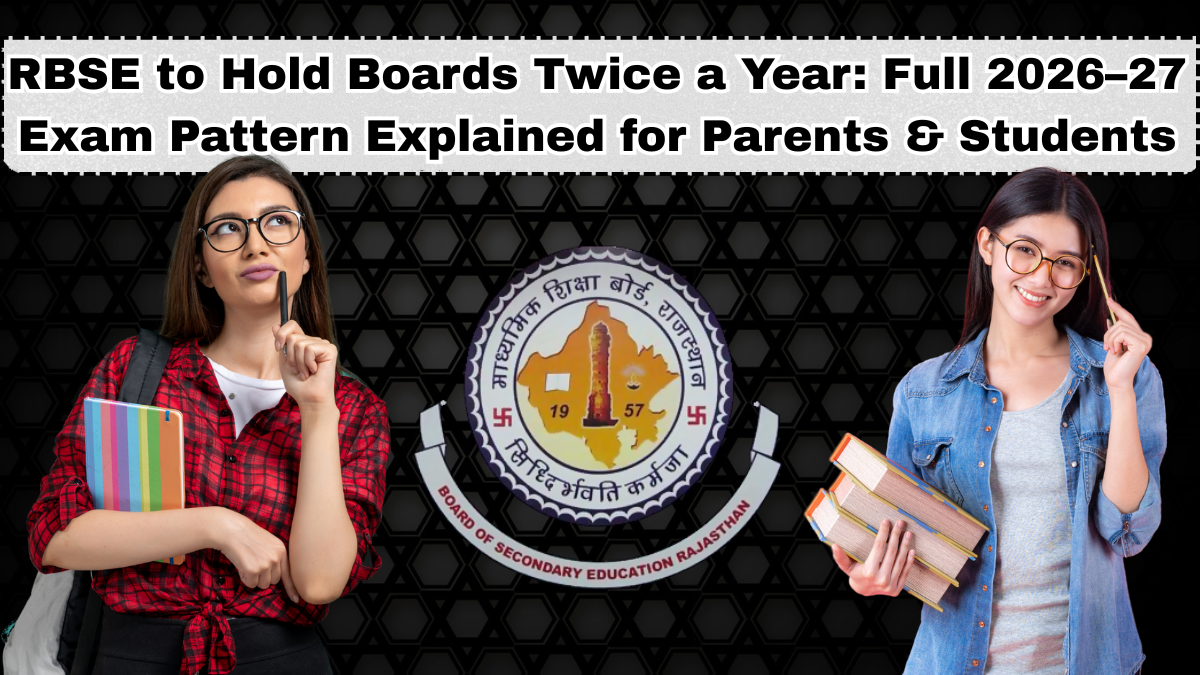The Rajasthan Board of Secondary Education (RBSE) has announced a major shift inspired by NEP 2020—starting 2026–27, students will face two board exams every academic year. This has sparked curiosity, confusion and relief among parents across the state. The new system aims to reduce exam pressure, give students more chances to improve marks, and make board exams more flexible. With the launch approaching, understanding the RBSE two board exams 2026-27 structure is essential for every Class 10 and 12 student.
The traditional “one exam decides everything” model has long been criticised for creating unnecessary stress. Students often struggle with performance pressure, illness during exam months, and limited opportunities to improve marks. The new RBSE pattern aligns with NEP 2020’s vision of continuous assessment and student-friendly reforms. While some families are excited about a second chance system, others worry about increased workload. This article breaks down how the biannual board exam format works and what it means for students academically and mentally.

What Exactly Is Changing in the RBSE Exam Pattern?
Starting 2026–27, RBSE will conduct two sets of board exams:
• Exam 1: Term 1 (around November–December)
• Exam 2: Term 2 (around March–April)
Students can appear for both exams, but only their best score will be counted as their final board result. This eliminates fear of failure and encourages learning consistency throughout the year.
The new approach allows students to treat the first board attempt as a low-pressure rehearsal and the second attempt as an opportunity for improvement. This flexible system embedded in RBSE two board exams 2026-27 aligns with global education trends.
Why the Change? The NEP 2020 Influence
The National Education Policy (NEP 2020) emphasises reducing exam stress and evaluating students in a less rigid manner. The one-board-one-shot system was considered outdated and unfair for students who may have bad exam days or health issues. NEP recommended:
• biannual board exams
• multiple improvement chances
• focus on concept clarity
• reducing memorisation
• equal weightage to both attempts
RBSE’s adoption of this model marks a major step toward modernising Rajasthan’s examination landscape.
How Two Exams Will Impact Students’ Academic Schedules
The biggest shift students will face is time management. The academic year will now be divided into two structured cycles:
Cycle 1 (April to November):
Concept learning, unit tests, internal assessments, and preparation for the first board exam.
Cycle 2 (December to March):
Focused revision, improvement of weak areas, and second board attempt.
The benefit is that students won’t have to handle the entire year’s syllabus in one go. Instead, they can prepare in smaller, manageable blocks. The new cycle is expected to reduce last-minute stress and distribute learning evenly.
Will This Increase or Reduce Stress?
Parents often ask whether two exams mean double pressure. In reality, the opposite is expected. The RBSE two board exams 2026-27 approach will:
• reduce fear of “one chance only”
• give students confidence through early practice
• allow second attempts without stigma
• help students experiment with study strategies
• create a more relaxed learning environment
For students who struggle with anxiety, this system brings relief. They no longer need to panic about one exam defining their entire academic future.
Impact on Coaching Centres and Schools
Coaching centres and schools in Rajasthan are already adjusting to the new pattern. Many institutions are planning:
• two revision batches
• mock exams aligned with Term 1 and Term 2
• modified timetables for balanced learning
• early syllabus completion cycles
• targeted improvement modules
Schools will also conduct more frequent internal assessments to track performance ahead of each attempt.
How Students Should Prepare Under the New Pattern
Here’s a simple preparation roadmap for both attempts:
For Exam 1 (Term 1):
• Focus on concept clarity
• Study regularly from April
• Make short notes for each chapter
• Solve unit tests and school worksheets
• Treat this exam as a “trial run”
For Exam 2 (Term 2):
• Revise everything from Term 1
• Focus heavily on improvement areas
• Solve full-length mock papers
• Build speed and accuracy
• Use Exam 1 feedback to boost scores
Students who follow this schedule will see steady performance growth across both attempts.
Parents’ Role in the New Board Exam System
Parents must adapt their expectations as well. Instead of pushing children to score high in the first term, they should:
• encourage a balanced approach
• reduce comparison with peers
• support mental well-being
• view Exam 1 as a learning opportunity
• focus on consistency rather than perfection
This mindset shift will help children approach exams with confidence instead of fear.
FAQs
Will the score from both exams be averaged?
No, the best of the two exam scores will be counted as the final board result.
Is it compulsory to attempt both exams?
No, students may attempt only one, but attempting both increases improvement chances.
Will the syllabus be divided for each exam?
No, both exams cover the full syllabus but in a balanced timeline.
Can students switch subjects between Exam 1 and Exam 2?
Subject changes follow RBSE rules, not exam cycle changes.
Does taking two exams affect competitive exam preparation?
Not negatively. In fact, consistent preparation helps students stay exam-ready throughout the year.
Click here to know more.
